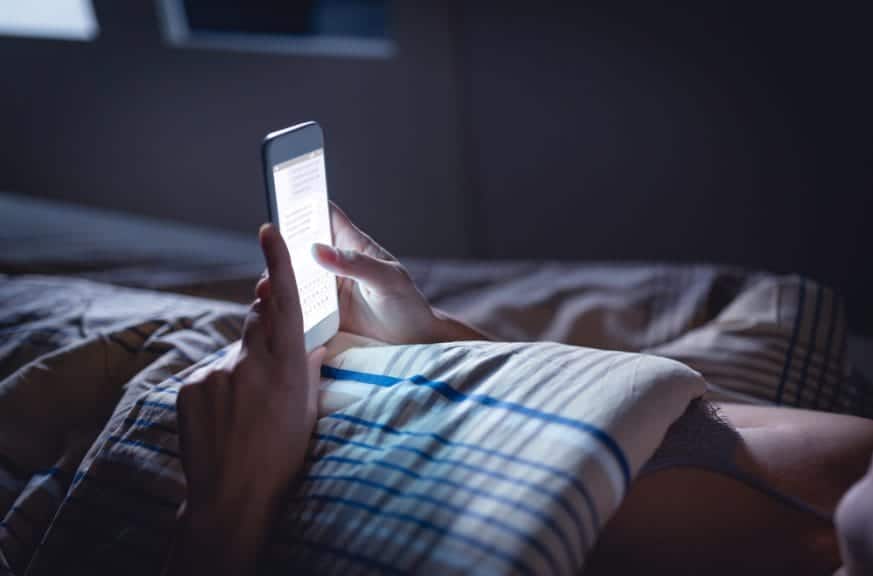According to Web MD, “doomscrolling” occurs when we spend a lot of time consuming negative information online, usually in the form of short videos or news stories. Screen time and “doomscrolling” go hand in hand. Even if your intention was to watch a funny cat video on your phone, you may eventually find yourself drowning in a digital sea of international crises like turbulent politics, mass shootings, war, and other disasters.
Limiting screen time is something we’ve heard parents do — or at least try to do — for their children, but what about the effects of too much screen time for adults? Does it really matter how long we spend on our devices?
Reid Health says that the average adult spends 11 hours on a screen every day. To put it into perspective, that’s longer than a typical 8-hour shift at work, and it’s much longer than most of us sleep at night. Think of all the other things you could be doing with your day that would improve your well-being.

Why You Should Care About Screen Time
Sleep Problems
Staring at a bright screen for hours at a time and overloading our minds with content makes it a lot more difficult to unwind when it’s time to go to sleep. While you may think to yourself, “I sleep just fine after being on my phone!”, just because you can fall asleep doesn’t mean that the sleep is high-quality; you may wake up feeling even more tired than when you originally laid down because your brain took longer to “turn off” and go into sleep mode.
Attention Deficit Hyperactivity Disorder (ADHD)
At one point or another, we’ve all found ourselves scrolling through social media when we know we have something else to do, like going to bed at a decent hour or working on an assignment. The rushes of dopamine we get when we see something we like, followed by the dramatic drop when we read something sad, can shorten our attention span. In an article for Fox News, Dr. Guenevere Rosenthal, a psychiatrist from Hackensack, NJ, claimed that too much screen time can lead to the development of ADHD, as our brains become accustomed to the instant gratification of social media. I’ll admit, as I’m writing this article, I find myself stopping every few minutes to scroll through Instagram. Our phones are addicting, and I mean that literally.
Addictive Behaviors
Like an alcoholic needs booze, you may find yourself itching to turn on your phone after being away from it. You may feel like you’re missing something important, like breaking news stories or trending videos. Or you may crave the mood boosting powers of funny reels. Going back to me drafting this article: every few minutes, I tell myself, “Researching and writing is stressful. I deserve a break!” Then I end up scrolling on my phone for longer than I’d planned to, so I snap out of it and rush back to writing. It’s a vicious cycle.

Depression
Too much screen time has also been shown to increase behaviors and emotions associated with depression. When we’re on our phone, we’re usually sitting or laying down, and the only things moving are our fingers on the screen. This lack of physical activity is horrible for our mental health because the happy chemical in our brains, serotonin, isn’t being released. Not to mention, it’s also not good for our bodies. The sedentary nature of screen time, plus with the troubling content we’re exposed to while “doomscrolling,” PLUS the images we see on social media of people living “perfect” lives that look nothing like our reality…it’s no wonder that being on our phones so much causes us to feel depressed.
Tips for Reducing Screen Time
At this point, you may be ready to throw away all of your technology. Slow down! The goal of this article isn’t to make you swear off smartphones forever; it’s just to make you more aware that there are consequences to too much screen time. It’s all about moderation and balancing screen time with device-less activities. Here are some ways you can cut back on screen time and improve your mental health and overall wellbeing.
Mindful Activities
There’s a great article on Trill Mag about different mindful activities. To be mindful means to be in the present. Looking at our devices so much can warp our sense of time and reality. Mindful activities such as reading, crocheting, baking, or making art can help recenter yourself and reduce stress.

Leave Your Phone in Another Room
Having your phone right next to your bed or on your desk where you’re working is too big of a temptation to resist. Now, I’m not suggesting you need to leave your phone on the other side of the house, but if you’re in the living room, put it in the kitchen. If you’re working in your bedroom, put it the living room. Keep the volume up so you can hear it ring if you get a call. By doing this, you’ll reduce the urge to open your phone and “doomscroll.” You’ll find yourself being more focused and productive throughout your daily routine.
Don’t Look At Your Phone When You Wake Up
The first thing I do when I open my eyes in the morning is tap my phone screen to see what time it is. Then, when I see I have a notification, I get excited and pick up my phone to see who messaged me. Instead of sleeping for a few extra minutes, I find myself searching Instagram and Facebook for some early morning entertainment. DON’T DO THIS! Allow yourself to wake up naturally, without the harsh, overstimulating light of your screen. Keep your phone away from your bed so that you don’t immediately reach for it in the morning, and you’ll find that you sleep better and have more energy during the day.
Turn On Screen Time Settings
Not having your Screen Time statistics displayed on your phone makes it easy to lose track, or purposely ignore, how long you’ve been scrolling. Go to your phone settings, and there should be a section that will tell you how many hours you spend on your phone. You can also use the setting to set a timer on how long you get to use certain apps on your device.

Screen time has become a necessary part of our daily lives. We need our devices to communicate with one another and to do our jobs. However, it is important that we limit our screen time outside of work to only about two hours, according to Reid Health. The rest of the time, the source claims, should be spent doing physical activity or other healthy habits that can help you feel more grounded and more productive. Reducing screen time is one of the best things you can do to improve your wellbeing.














